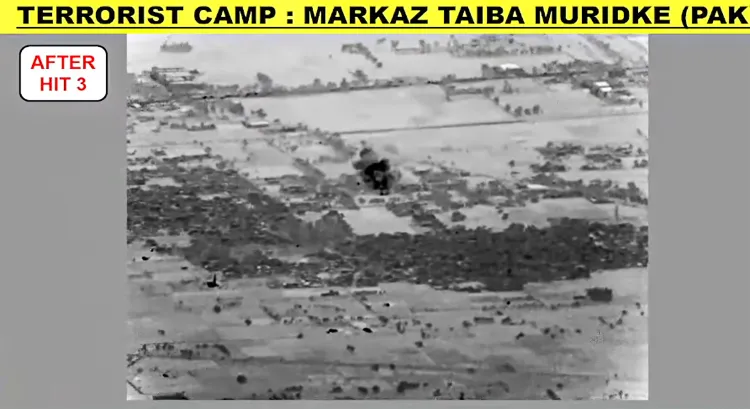Is Abu Jundal's Death a Turning Point in India's Fight Against Terror?

Synopsis
Key Takeaways
- Significant loss of terrorists in military strikes.
- Abu Jundal's death has international repercussions.
- Muridke camp was a key terrorist training site.
- India's military response sends a strong message.
- Need for international support in combating terrorism.
New Delhi, May 10 (NationPress) Over 100 individuals linked to extremist organizations based in Pakistan, including Lashkar-e-Taiba (LeT) and Jaish-e-Muhammed (JeM), reportedly lost their lives during Indian military operations on May 7.
Mudassar Khadian Khas, known as Abu Jundal, was identified as a significant loss for the Indian forces, who executed precise strikes at five sites in Pakistan-occupied Kashmir and four within Pakistan. This action was in retaliation for a brutal terrorist assault in Pahalgam, Jammu & Kashmir.
Top defense officials have validated his demise.
Among the key targets were Muridke and Bahawalpur, crucial locations in this military operation. Muridke served as the headquarters for Lashkar, while Bahawalpur was the central hub for JeM.
Abu Jundal oversaw the Markaz Taiba in Muridke, which functioned as a recruitment and indoctrination center for new terrorists. This facility, once funded by Al-Qaeda’s Osama Bin Laden, became notorious for radicalizing students and encouraging them to engage in jihad.
It was here that the attackers of the 26/11 Mumbai attacks, including Ajmal Kasab, received intelligence training. Other conspirators, such as David Coleman Headley and Tahawwur Hussain Rana, also had connections to Muridke.
India prioritized the Muridke camp and successfully targeted it on May 7, resulting in the elimination of Abu Jundal and many of his associates.
The death of the LeT HQs leader drew international condemnation, particularly following his state funeral in Muridke, attended by high-ranking Pakistani military officials, which triggered global outrage.
Reports indicated that the Pakistani Army honored the terrorist with a ceremonial guard and laid wreaths on behalf of the Army Chief and Punjab Chief Minister, Maryam Nawaz.
The funeral prayer, led by Hafiz Abdul Rauf of JuD (a recognized global terrorist), occurred in a government school, escalating tensions and prompting calls from various governments against Pakistan’s overt support for terrorist entities.
Footage showing Abdur Rauf surrounded by military personnel circulated online, leading many to demand action against Pakistan and its contradictory stance on terrorism.
Significantly, while Muridke and Bahawalpur have long been monitored by Indian intelligence, this was the first instance of the Indian government directly targeting these terror strongholds.
The precise strikes on LeT and JeM HQs not only dismantle terrorist infrastructure in Pakistan but also symbolize India's firm commitment to combat terrorism, sending a clear message globally about India's resolve to hold terrorists and their financiers accountable.









